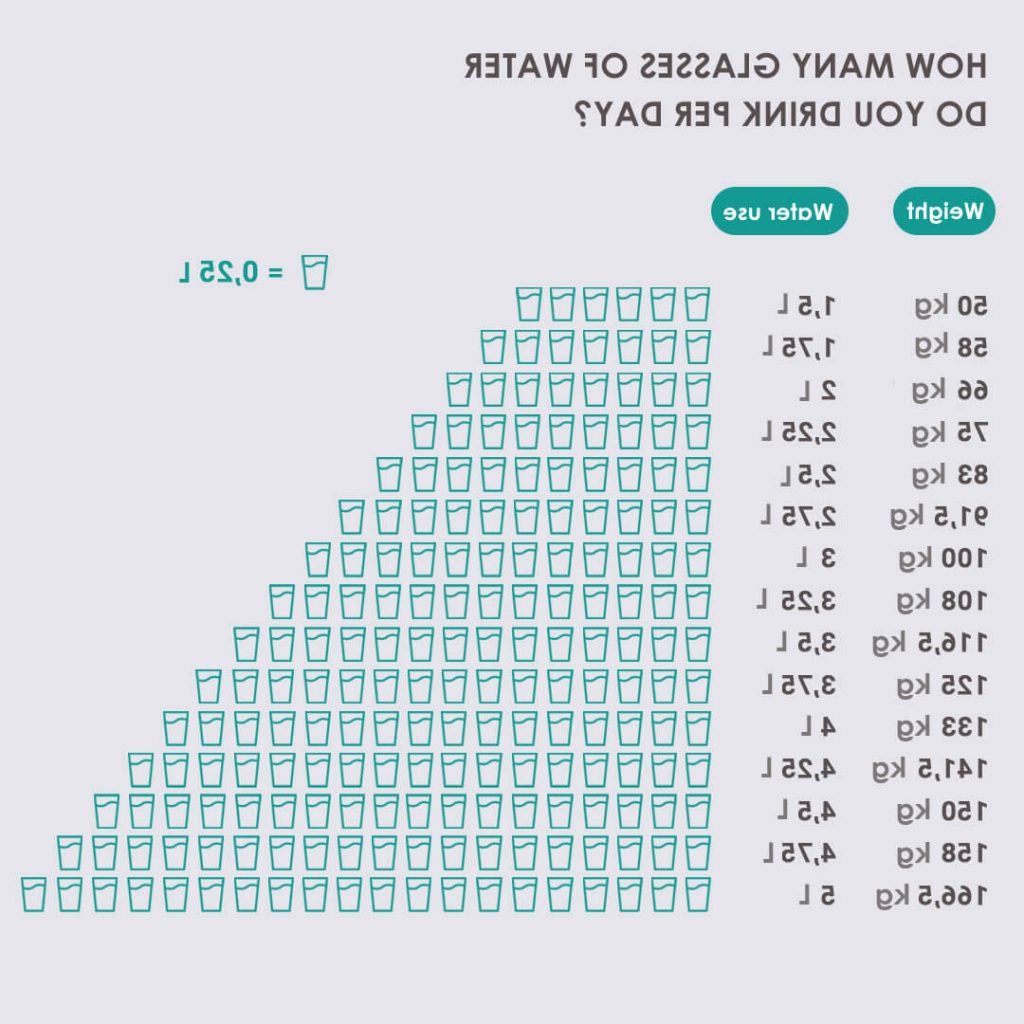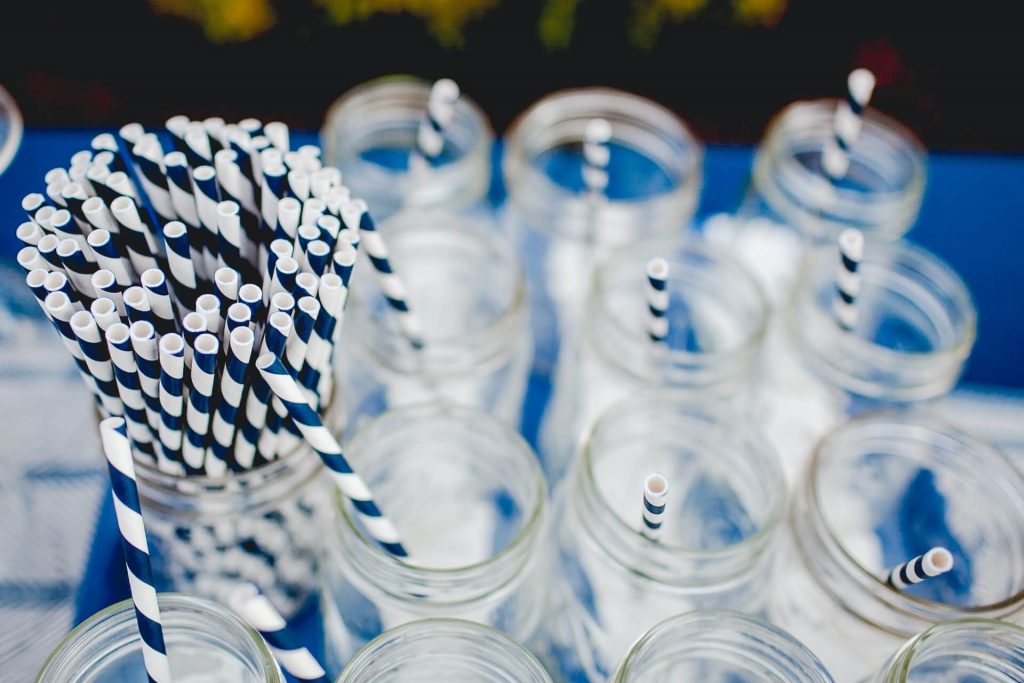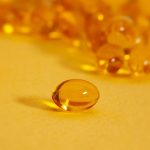Water is the basis of our life. As we know, a person can’t live more than four days without water, and the loss of just 1% of fluid causes thirst. The amount of water we drink determines our health, the condition of our epidermis and hair and our general well-being.
The percentage of water in the human body varies depending on age. For example, a newborn baby consists of 90% water. But with age, the amount of fluid decreases, and by old age the percentage of water in the body drops to 60%. Unfortunately, it is impossible to stop this process completely. However, we can do our best to keep a drinking regime and maintain a correct water balance as long as possible, prolonging our life and health.
Why water is important to our health
Water is involved in all biochemical processes of the body, such as:
- metabolism,
- digestion,
- blood formation,
- blood pressure regulation,
- thermoregulation,
- excretion of toxins.
Disruption of these processes affects the condition of hair, skin, nails, as well as the functioning of all body systems, the musculoskeletal system, and the brain. Not without reason, doctors believe that dehydration can cause absent-mindedness and headaches. After all, the human brain consists of 75% of fluid.
It’s the same with blood. The less water in our body, the thicker the blood and the higher the blood pressure. This is why hypertensive people need to watch their water balance particularly carefully.
When the body feels the lack of water, it begins to increase the production of histamine – the hormone responsible for the immune response in an alarming situation for the body. However, an overabundance of histamine activates not only the immune system, but also allergies. That’s why following a drinking regimen for allergy sufferers is especially important.
Water dissolves and delivers a variety of nutrients to the tissues. Without water, it is impossible for the joints and muscles to work properly. With its scarcity dramatically increases the likelihood of arthritis and osteochondrosis because of the constant wear and tear of fragile cartilage.
People suffering from diabetes should control their blood sugar. A glass of water instead of juice or a sugary drink allows them to keep their sugar levels under control. Whereas drinks that contain sugar can cause blood sugar levels to spike and increase thirst.
Dehydration
When dehydration occurs, the body takes water from the cells to maintain the most important functions. As a result, cell function is impaired. The blood thickens and moves more slowly, so oxygen is delayed.
Signs that tell you that you are not drinking enough water:
- a feeling of thirst and a dry mouth;
- a dark yellow color in your urine;
- flaky skin, cracked skin;
- headaches;
- drowsiness and lethargy;
- rapid heartbeat.
Unfortunately, in the beginning, these signs may appear separately, do not give an overall picture of the problem or be attributed to the manifestations of other diseases.

Overhydration
Healthy adult kidneys can process up to one liter of water per hour. Anything more than this could be considered harmful and even dangerous. In normal life this practically does not happen. However, under the confluence of a number of circumstances it is possible, as a result of which a person may drink an excessive amount of water.
An overabundance of water, that is, the consumption of more than 4-5 liters per day is fraught with the following consequences:
- increased kidney function;
- increased protein breakdown;
- increased sweating;
- washout of essential salts and an imbalance of salts;
- a dilution of gastric juices and a slowing down of digestion.
In addition, people with liver and kidney disease should be careful with the intake of water. Excessive consumption of liquids for them can be dangerous to health. In this matter, they should strictly follow the doctor’s recommendations.
What is a drinking regimen?
One of the most common misconceptions is that the drinking regimen is equated with fluid intake in general, including all drinks that enter our body. It is important to remember that juices, morsels, sodas, milk, coffee and tea cannot replace water. Our body perceives them as food and spends every effort to extract water from them.
In order to function properly, the human body needs a certain amount of just pure water. To calculate how much water we need to drink per kilogram of weight, we can use a simple formula – we will tell you about it further on.
How much water should I drink per day?

The statement that all people need to drink 8 glasses of water a day is not entirely accurate. One should calculate the necessary amount of water based on individual characteristics, lifestyle, weight and age of a particular person. It is also worth taking into account physical activity during the day, the presence of chronic diseases, weather conditions and some other indicators.
The right drinking regimen
People who lead healthy lifestyles have probably heard that it is not recommended to drink water while eating. It dilutes the gastric juices, preventing the food from digesting. Foods have an approximate digestion time – this is what you should use as a guide when deciding when you can drink after a meal. It takes the longest time to digest dairy products – more than two hours; bread products, pasta will occupy the stomach for more than an hour. Remember that the duration of digestion also depends on the volume of food eaten – the more, the longer.
Why is it important for a person to determine how many liters of water to drink per day? The thing is that because of the fast and busy pace of our life we sometimes forget about the needs of our body, and even a small lack of fluid can lead to the beginning of dehydration and to feeling unwell. The easiest way to calculate whether you are drinking your fluid allowance is visual. Use a reusable water bottle, refill it each time it is empty, and record the data.
What kind of water should I drink?
The most useful water is raw water, i.e. undistilled and unboiled water. But in our ecological conditions tap water carries a lot of harmful impurities. That is why it must be filtered with powerful purification systems.

Boiling removes magnesium and calcium salts, which the body needs. In addition, boiled water has practically no oxygen.
It is unacceptable to drink mineral water uncontrollably and a lot – it is enriched with minerals and salts, which can accumulate in the body and give negative effects. The composition of the mineral water affects the solution of specific problems, and it should be recommended by a gastroenterologist.
It is safest to use water after quality and reliable purification systems.
Water and weight
You can find many articles on the Internet on the relationship between water and weight loss. To some extent, drinking clean water does promote weight loss – largely due to the fact that it suppresses appetite. Very often, when we want something to eat, our body actually signals a desire to drink. And drinking a cup of water is enough to satisfy this desire, while eating a sandwich or other snack will bring new pounds.
Many women are concerned about the question: how much water should they drink to lose weight? Experts believe that when losing weight it is necessary to increase the consumption of water by 30% in relation to the calculation. First of all, this is due to the fact that during the decomposition of adipose tissue there is an active emission of toxins, which are removed from the body thanks to the water. Also, when losing weight girls often use protein diets, and water is also necessary for the proper breakdown of protein.
In special situations
There are a number of situations and conditions that provoke an increased need for water.
Smoking dries the mucous tissues of the nasopharynx, which causes a decrease in local immunity and increases vulnerability to infections. Smokers need to increase water in their diet by 60%.
Viral diseases, increased body temperature cause the body to lose a lot of moisture, so it is desirable to significantly (almost twice) increase water intake for the duration of the illness.
Breastfeeding. For the flow of milk, you need a lot of fluids. Any breastfeeding mother should increase the amount of water consumed per day by 50% on average and even by 150% if the milk comes little.
Athletes should drink twice as much water at increased physical activity, because the body loses a lot of water with sweat during training.
Water balance should also be replenished with additional fluids while taking diuretics, diarrhea or vomiting.
If you are pregnant
During pregnancy, some expectant mothers limit themselves to drinking for fear of having too much water. This is misleading. Water is necessary for the correct course of pregnancy, and the amount of amniotic fluid is in no way connected with the amount of fluid consumed, but is a consequence of the diseases. Also, swelling is a cause of concern for pregnant women. However, water by itself, even in large quantities, may not lead to edema. But in combination with diabetes, with the use of salty and spicy food, with a lack of protein in the diet you will be guaranteed edema. If they occur, we recommend that you immediately consult a doctor in order to establish the exact cause of their appearance.
Even with a normal pregnancy should not drink a lot of water in the evening. This may badly affect the quality of sleep.
The importance of clean water for children
Teach children to drink plain water from an early age. Of course, they are much more fond of sweet and carbonated drinks, but sodas are no substitute for water and not only are not useful, but often even harmful to children’s bodies and teenagers. Remember that it is much more difficult to wean from soda than to accustom the baby to drink clean water from childhood.
An infant should be given very little water if he is given formula. If the baby is breastfed naturally, the need for water occurs only during the introduction of complementary foods or in hot weather because he gets everything he needs with his mother’s milk.
At one year of age and later, when the baby begins to eat more and more grown-up food, the volume of water must be increased. The formula for calculation is approximately 30 ml per 1 kg of weight. If there are sports in the child’s life, the amount of water should be adjusted upwards.
Equally important is what kind of water children drink. Try to avoid bottled water, giving preference to that which has passed through home filtration systems.


